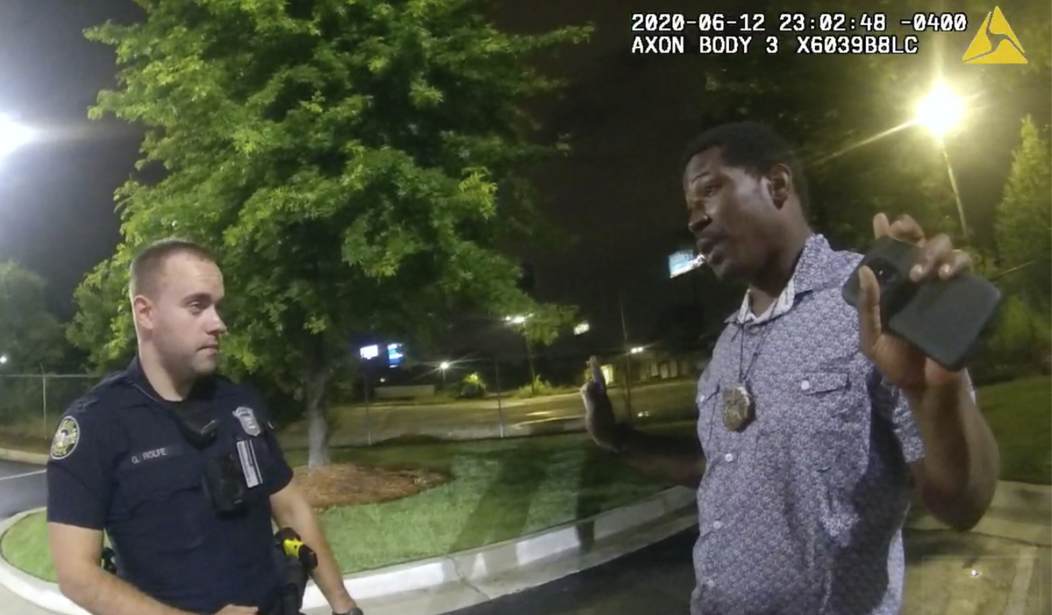In the aftermath of George Floyd’s death, the subject of racism and police brutality has been at the forefront of our political discourse. While both are important matters to explore and discuss, the fact is that such debate is not being held on an objective foundation. Instead, narrative has become more important than fact, with an intentional effort to conflate even the most dissimilar events in order to promote the political aims of the Black Lives Matter movement.
The reaction to Rayshard Brooks’ death is an example of this conflation. On June 12th, police officers were called to a Wendy’s restaurant in Atlanta. Mr. Brooks had “fallen asleep in his vehicle, which was parked in the drive-through, causing other customers to drive around him.” After an initially civil interaction involving an alcohol test, Officer Brosnan and Officer Rolfe then started to arrest Mr. Brooks. As they attempted to place him in handcuffs, Mr. Brooks grappled with the officers, violently resisting arrest. He then seized a taser from Officer Brosnan, punched Officer Rolfe, and then fled the scene after being hit by a taser dart fired by Officer Rolfe. While running, Mr Brooks turned and fired the Taser in Officer Rolfe’s direction, with Officer Rolfe returning fire with his handgun. Mr. Brooks died later in hospital.
According to the Atlanta Police Department’s Standard Operating Procedures, the actions taken by the officers were clearly within departmental guidelines. Under ADP SOP 3010 “Use of Force.”
“An employee may use deadly force to apprehend a suspected felon only when: 1. He or she reasonably believes that the suspect possesses a deadly weapon or any object, device, or instrument which, when used offensively against a person, is likely to or actually does result in serious bodily injury and when he or she reasonably believes that the suspect poses an immediate threat of serious bodily injury to the officer or others; or…”
Regardless of Mr. Brooks’ culpability for his death as the result of his violent actions, the underlying narrative of systematic and racist police brutality remains more powerful than even incontrovertible video evidence. The officer has been fired, police Chief Erika Shields has stepped down, and Chassidy Evans, Rayshard Brooks’ niece, stated “Not only did we lose another black, unarmed male. This time it landed on our front doorstep."
Recommended
First, Rayshard Brooks was clearly not unarmed and was attempting to use a stolen weapon after violently resisting arrest and assaulting a police officer. This detail alone sets Rayshard Brooks apart from George Floyd, whose murder occurred with no threat posed to the arresting officers. By allowing two disparate scenarios to be compared by nature of skin color alone does disservice to the entire notion of police brutality by making the implicit claim that the use of force against every black man by police is unjust.
The unfortunate and brutal fact is that some people are killed without adequate justification by the police in appalling and morally abhorrent situations - such as George Floyd or Breonna Taylor - while others are killed with full justification in acts of self-defense. Each case involves individual humans and their choices, and so we should judge them as such. To apply subjective assumptions of innocence or guilt based on skin color alone is both dangerous and fundamentally racist.
What makes matters worse is that there is a growing attempt to justify the act of resisting arrest by making the unsubstantiated claim that the individual in question is at a heightened risk of being killed. Family attorney L. Chris Stewart stated, “People ask, 'Why would (Brooks) resist if they're trying to put him in handcuffs?' Well, they put George Floyd in handcuffs, and he was subsequently killed. So just getting put in handcuffs -- if you're African American -- doesn't mean you're going to be nicely taken to the back of a police car."
If we are seriously considering the notion that we should justify violent actions against police officers who are obeying the law, then we are truly opening the door to lawlessness and anarchy. By conflating contrasting cases as evidence of a narrative with a complete disregard for facts or nuance, we are making it impossible for police officers to do their job. Indeed, by justifying violence against officers, we should not be surprised when many decide that placing their lives on the line on a daily basis is hardly worth the risk. When that day comes, will narrative remain as important as reality?

























Join the conversation as a VIP Member